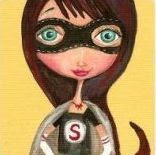Irène NémirovskyI'm not going to scale this book, because you can't honestly scale a rough draft, which is what Suite Francaise is. It was handwritten during WWII, in a notebook, by a woman who did not live to see the completion of her planned work. Composed of two short books, entitled "A Storm in June" and "Dolce," Suite Francaise is remarkable, both because even in rough draft form it's in very little need of polishing, and because it was written so well under dire and terrible conditions. Married and a mother of two small girls, Némirovsky was both Russian and of Jewish descent, living in France under Nazi occupation and at a time when Germany had been attacked by and was engaged in war with Russia. In addition to the obvious stress that living with the fear of interment would cause, the German government froze her bank accounts and ordered her publishers to continue to deposit all payments owed to her into those accounts (as they did with all Jewish artists), greatly hindering Némirovsky from accessing her income. In addition, publication of works created by foreigners and Jews was forbidden, effectively severing her revenue stream. She was deported to Auschwitz in July, 1942, where she died one month later. Her children kept her notebook as a memento of their mother, believing it to be a diary. It was not until they had long grown into adults that eldest daughter Denise could bring herself to read the notebook and realized that what she held was her mother's final work.
I fully expected the book to be very sad and tragic, and for it to upset me. But Némirovsky's pragmatism comes across in the storytelling. People die, but they do so dispassionately. Their deaths may be violent, but they are also matter-of-fact: this is war - people die. I regret she was unable to finish the entire work, as both Storm and Dolce are vivid works full of memorable characters one can not help but think must be drawn from those Némirovsky knew in real life. They are detestable and not, honorable and not, and all their motives are made clear - Némirovsky does not leave the reader to guess at intentions, nor does she make excuses for their being or behaviour. Things are what they are. Némirovsky is a keenly visual storyteller, and I think Suite Francaise is probably a very good description of life in occupied France during the first few years of the war. It's a great loss that Némirovsky did not live through the war to document its end as she did the beginning.
Suite Francaise is translated from the French by Sandra Smith, who seems to have done an excellent job. My only quibble with her work is that she left uncorrected a few things which Némirovsky would obviously have chosen to correct. She says she did so out of the desire to demonstrate the circumstances of its writing, but I feel it was a disservice to Némirovsky and her work to leave them as they were. I strongly recommend you read both appendices and the Preface to the French Edition of Suite Francaise, located at the back of the book. I started with the first appendix, which contains various of her notes on the writing and what she hoped to achieve, as well as her final journal entry, 2 days before she was taken. I then read the book and finished with the second appendix and the preface, both of which deal with the end days of Némirovsky's life and its effect on those who knew her, itself worthy of a book. I feel sad Némirovsky was unable to finish her opus and that her life was ended as it was. She was a gifted storyteller. And as a human being, she deserved better.

